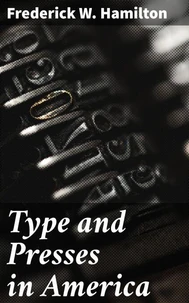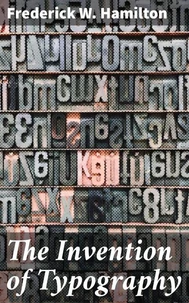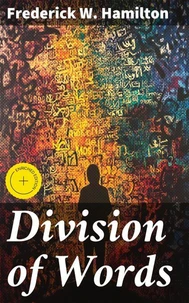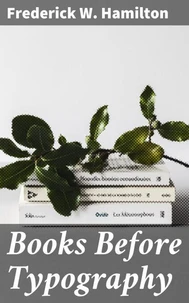Books Before Typography
Par :Formats :
Disponible dans votre compte client Decitre ou Furet du Nord dès validation de votre commande. Le format ePub est :
- Compatible avec une lecture sur My Vivlio (smartphone, tablette, ordinateur)
- Compatible avec une lecture sur liseuses Vivlio
- Pour les liseuses autres que Vivlio, vous devez utiliser le logiciel Adobe Digital Edition. Non compatible avec la lecture sur les liseuses Kindle, Remarkable et Sony
 , qui est-ce ?
, qui est-ce ?Notre partenaire de plateforme de lecture numérique où vous retrouverez l'ensemble de vos ebooks gratuitement
Pour en savoir plus sur nos ebooks, consultez notre aide en ligne ici
- Nombre de pages428
- FormatePub
- ISBN859-65--4724067-9
- EAN8596547240679
- Date de parution04/09/2022
- Protection num.Digital Watermarking
- Taille632 Ko
- Infos supplémentairesepub
- ÉditeurDIGICAT
Résumé
In "Books Before Typography, " Frederick W. Hamilton delves into the rich and largely unexamined realm of manuscript culture prior to the advent of the printing press. Through a meticulous examination of the evolution of book-making-from ancient scrolls to illuminated manuscripts-Hamilton employs a combination of textual analysis and historical context to unravel the complexities of early literate practices.
His writing strikes an engaging balance between scholarly rigor and accessibility, inviting readers to consider the profound implications of the transition from handwritten to printed texts for cultural dissemination and literacy. Frederick W. Hamilton, an esteemed scholar of medieval literature with a particular focus on manuscript studies, draws on his extensive research and personal passion for historical linguistics to shed light on this underappreciated period.
His academic background and expertise in archival materials enable him to capture the intricate details of the social and economic conditions that influenced book creation, providing a nuanced view of the labor and artistry involved in early book production. For readers interested in the history of literature, the evolution of reading practices, or the cultural significance of books, "Books Before Typography" serves as an invaluable resource.
Hamilton's insightful exploration not only enriches our understanding of this pivotal moment in literary history but also invites us to reflect on our relationship with texts-making it essential reading for scholars and enthusiasts alike.
His writing strikes an engaging balance between scholarly rigor and accessibility, inviting readers to consider the profound implications of the transition from handwritten to printed texts for cultural dissemination and literacy. Frederick W. Hamilton, an esteemed scholar of medieval literature with a particular focus on manuscript studies, draws on his extensive research and personal passion for historical linguistics to shed light on this underappreciated period.
His academic background and expertise in archival materials enable him to capture the intricate details of the social and economic conditions that influenced book creation, providing a nuanced view of the labor and artistry involved in early book production. For readers interested in the history of literature, the evolution of reading practices, or the cultural significance of books, "Books Before Typography" serves as an invaluable resource.
Hamilton's insightful exploration not only enriches our understanding of this pivotal moment in literary history but also invites us to reflect on our relationship with texts-making it essential reading for scholars and enthusiasts alike.
In "Books Before Typography, " Frederick W. Hamilton delves into the rich and largely unexamined realm of manuscript culture prior to the advent of the printing press. Through a meticulous examination of the evolution of book-making-from ancient scrolls to illuminated manuscripts-Hamilton employs a combination of textual analysis and historical context to unravel the complexities of early literate practices.
His writing strikes an engaging balance between scholarly rigor and accessibility, inviting readers to consider the profound implications of the transition from handwritten to printed texts for cultural dissemination and literacy. Frederick W. Hamilton, an esteemed scholar of medieval literature with a particular focus on manuscript studies, draws on his extensive research and personal passion for historical linguistics to shed light on this underappreciated period.
His academic background and expertise in archival materials enable him to capture the intricate details of the social and economic conditions that influenced book creation, providing a nuanced view of the labor and artistry involved in early book production. For readers interested in the history of literature, the evolution of reading practices, or the cultural significance of books, "Books Before Typography" serves as an invaluable resource.
Hamilton's insightful exploration not only enriches our understanding of this pivotal moment in literary history but also invites us to reflect on our relationship with texts-making it essential reading for scholars and enthusiasts alike.
His writing strikes an engaging balance between scholarly rigor and accessibility, inviting readers to consider the profound implications of the transition from handwritten to printed texts for cultural dissemination and literacy. Frederick W. Hamilton, an esteemed scholar of medieval literature with a particular focus on manuscript studies, draws on his extensive research and personal passion for historical linguistics to shed light on this underappreciated period.
His academic background and expertise in archival materials enable him to capture the intricate details of the social and economic conditions that influenced book creation, providing a nuanced view of the labor and artistry involved in early book production. For readers interested in the history of literature, the evolution of reading practices, or the cultural significance of books, "Books Before Typography" serves as an invaluable resource.
Hamilton's insightful exploration not only enriches our understanding of this pivotal moment in literary history but also invites us to reflect on our relationship with texts-making it essential reading for scholars and enthusiasts alike.






